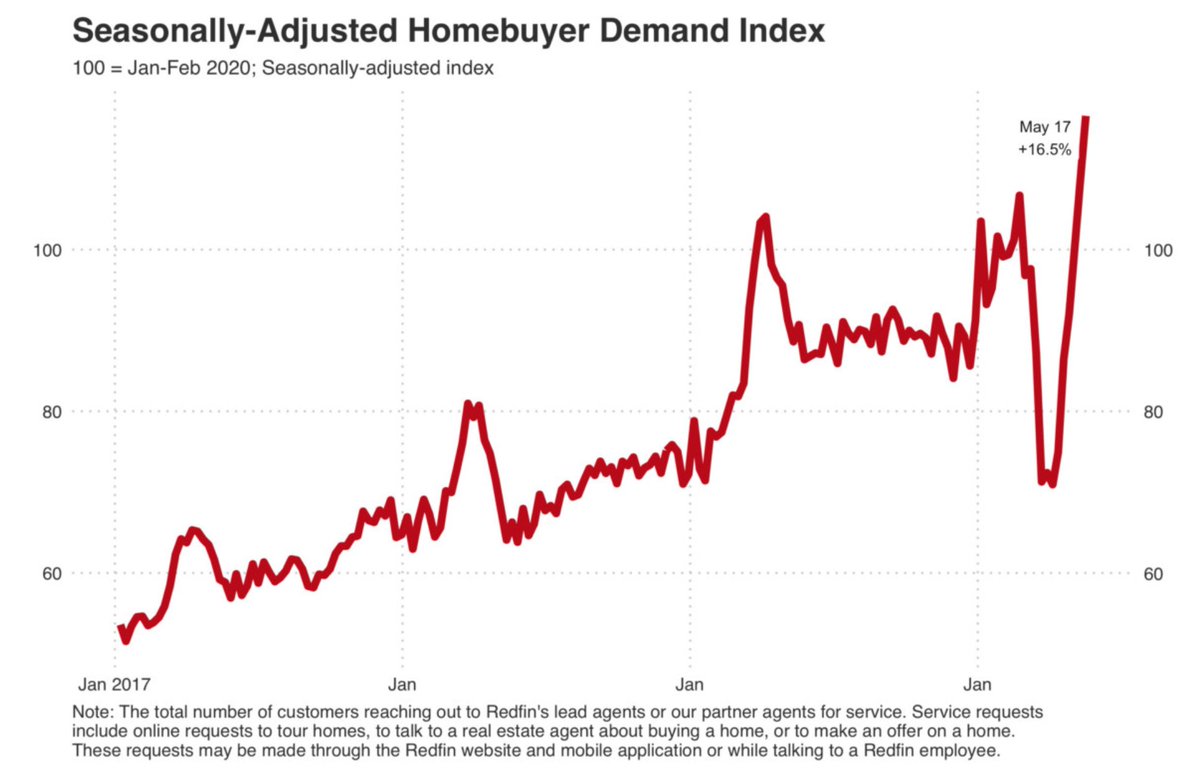1 of 15: It has been hard to convey, through anecdotes or data, how bizarre the U.S. housing market has become. For example, a Bethesda, Maryland homebuyer working with @Redfin included in her written offer a pledge to name her first-born child after the seller. She lost.
2 of 15: There are now more Realtors than listings.
3 of 15: Inventory is down 37% year over year to a record low. The typical home sells in 17 days, a record low. Home prices are up a record amount, 24% year over year, to a record high. And still homes sell on average for 1.7% higher than the asking price, another record.
4 of 15: But in two of America’s largest cities, inventory has increased, in New York by 28%, in San Francisco by 77%. San Francisco hasn’t had an inventory increase this large since 2008. And still in both markets, prices are increasing.
5 of 15: In 2020, new-construction permits were *down* 13% in DC and New York, 40% in LA, 48% in Chicago, 50% in Seattle, 79% in San Francisco. Permits were *up* 25% in Miami, 56% in Vegas, 96% in Greenville, 122% in Detroit, 246% in Knoxville.
6 of 15: Lumber prices are up 300%.
7 of 15: In Redfin’s annual survey of nearly 2,000 homebuyers, 63% reported having bid on a home they hadn’t seen in person.
8 of 15: In an April survey of 600 Redfin.com users who had relocated in the past year, about two thirds of the people who moved got a house the same size or bigger, but about the same proportion, two thirds, spent the same or *less* on housing.
9 of 15: Even though most of the people who moved got a bigger home, 78% reported having the same or more disposable income after their move. Idaho home prices could triple and still seem affordable to a Californian.
10 of 15: For low-tax states, 4 people move in for every 1 who leaves. For Texas, this ratio is 5:1; for Florida, 7:1. Cites & states have no leverage to raise taxes, after many promised new money for social justice; the federal government will have to fund long-term investments.
11 of 15: This migration to lower-cost areas may lead to lower workforce participation. For many families @Redfin has relocated, the money saved on housing costs lets one parent stop working. A wave of Redfin customers are retiring early.
12 of 15: Lenders are calling employers to confirm that the homebuyer will have permission to work remotely when the pandemic ends. Rates are lower for loans on primary residences, and the lender also wants to make sure the borrower actually plans to work after getting the loan.
13 of 15: The average housing budget for out-of-towners moving to Nashville was $720K, ~50% higher than locals’ $485K budget. It used to be coastal elites who worried that every adult in the family had to win a career lottery, just to afford a home. Now that feeling may spread.
14 of 15: it’s not just income that’s k-shaped, but mobility. 90% of people earning $100,000+ per year expect to be able to work virtually, compared to 10% of those earning $40,000 or less per year. The folks who need low-cost housing the most have the least flexibility to move.
15 of 15: an investor recently said, with an ancient touch of awe but also greed, that one source of America’s miraculous economic recovery was the bounty of “the land itself.” We have more room to grow than we ever imagined. We just have to make sure that benefits everyone.
• • •
Missing some Tweet in this thread? You can try to
force a refresh





